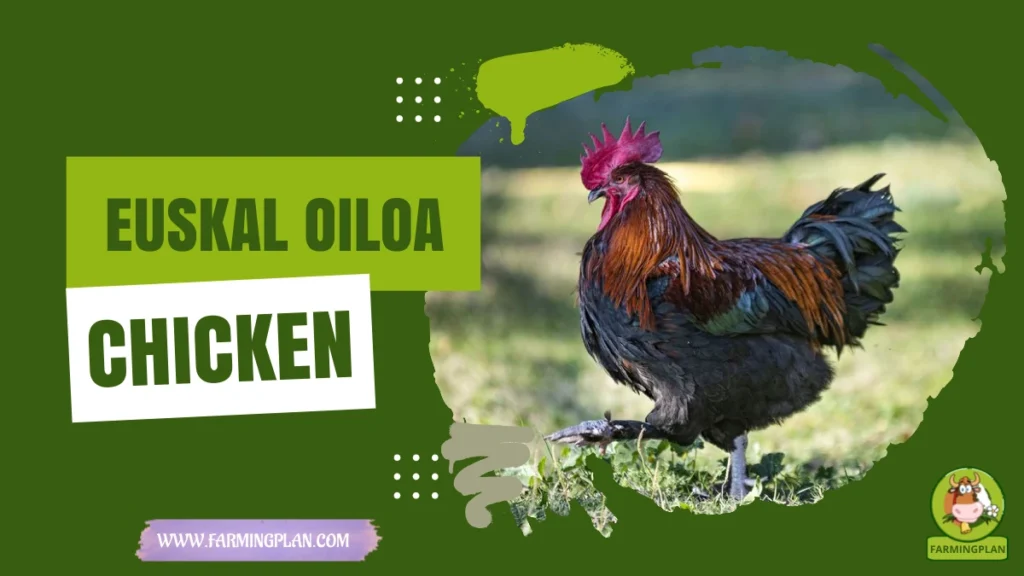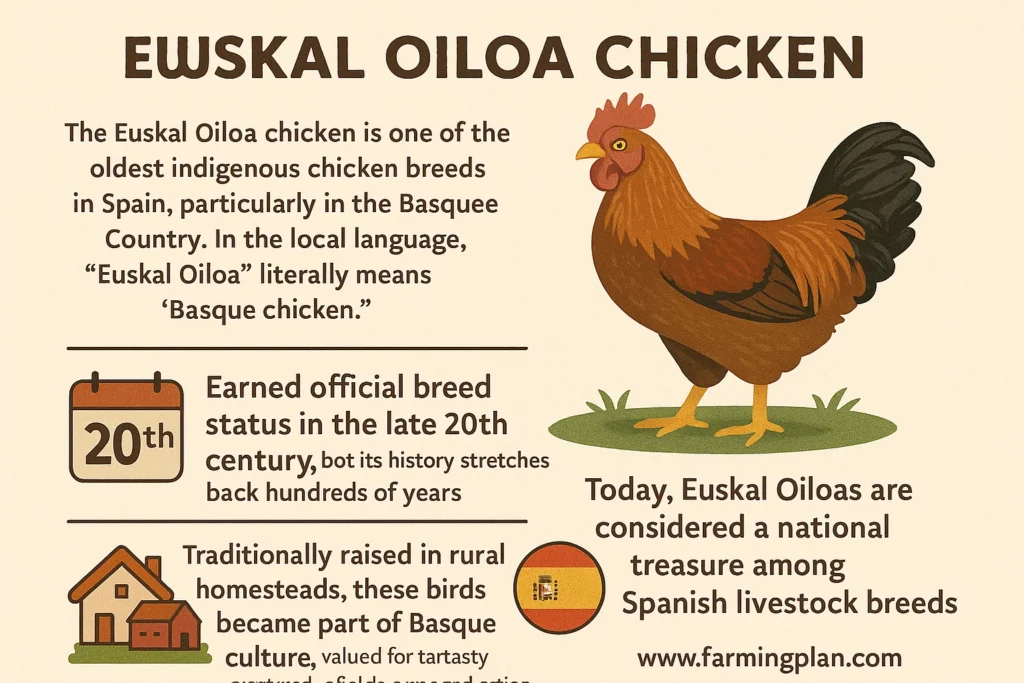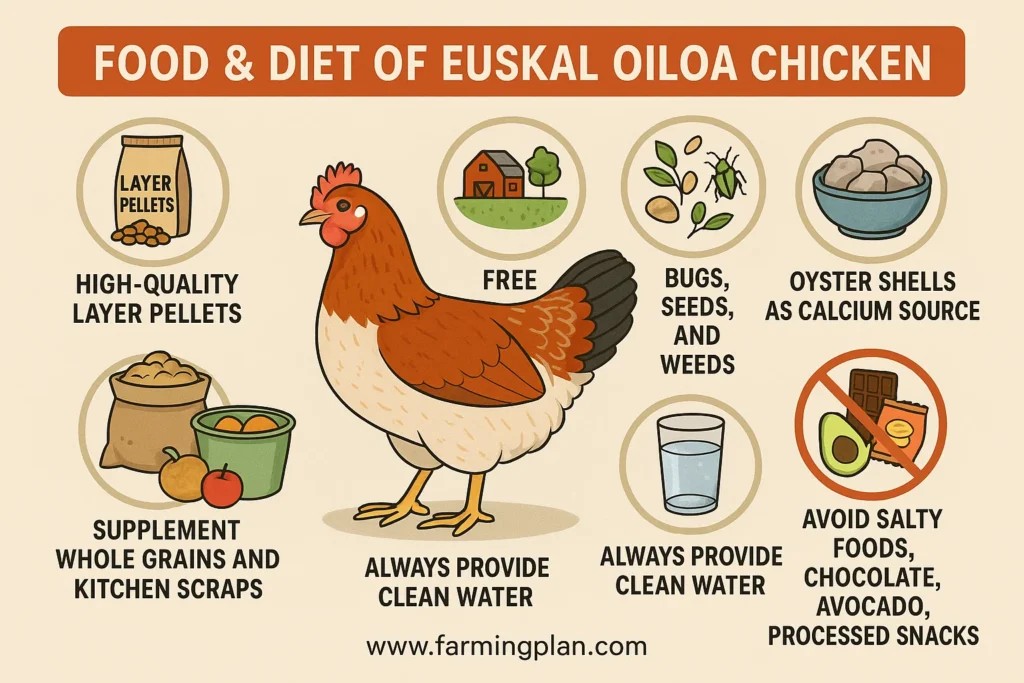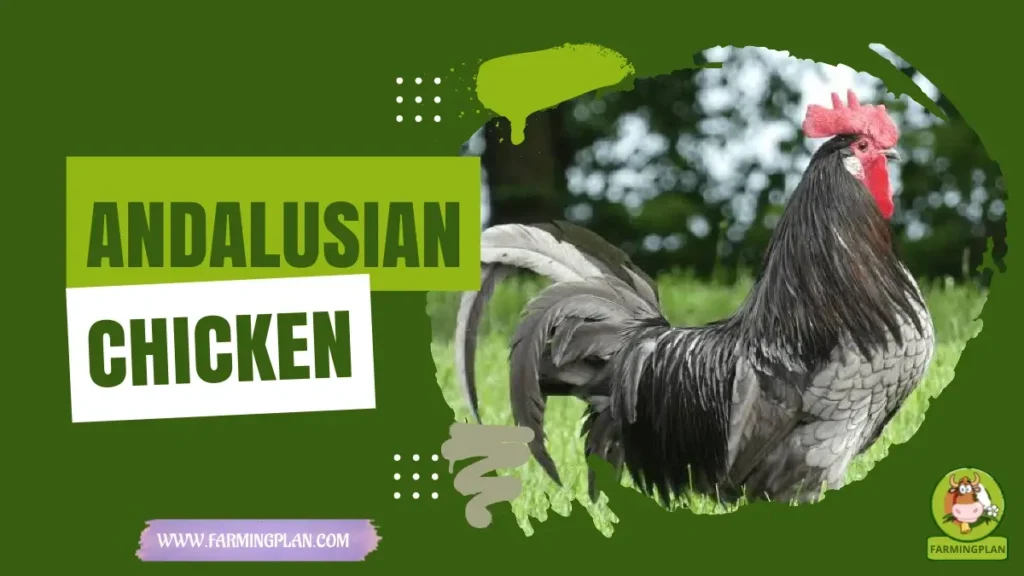The Euskal Oiloa chicken is one of the most charming traditional breeds I’ve worked with. It hails from the Basque region of Spain and is known for its beautiful feather patterns, friendly temperament, and excellent dual-purpose qualities. Whether you’re a hobbyist looking for colorful hens in the yard or a small-scale farmer wanting eggs and meat, this breed checks every box. In this article, I’ll walk you through everything I know about Euskal Oiloas – their history, features, personality, diet, health tips, farming guide, and more. Stick with me and you’ll find out why this lesser-known chicken deserves more love. Let’s dive in!

History & Origin of Euskal Oiloa Chicken
The Euskal Oiloa chicken is one of the oldest indigenous chicken breeds in Spain, particularly in the Basque Country. In the local language, “Euskal Oiloa” literally means “Basque chicken.” This breed earned official breed status in the late 20th century, but its history stretches back hundreds of years.

Traditionally raised in rural homesteads, these birds became part of Basque culture, valued for both their tasty meat and reliable egg production. As modern hybrid breeds took over commercial poultry farms, the Euskal Oiloa became endangered. However, thanks to conservation programs, which involve breeding and protecting rare and endangered species, and the efforts of dedicated breeders, they’re now regaining popularity among traditional farmers and hobbyists.
Today, Euskal Oiloas are considered a national treasure among Spanish livestock breeds, and they play a key role in the preservation of the Basque gene pool. This gene pool refers to the unique genetic characteristics of the Basque region’s livestock, which the Euskal Oiloa breed contributes to and helps maintain.
Read More: Pigeon Breeds That’ll Win Your Heart Instantly
Characteristics of Euskal Oiloa Chicken
These birds are a medium-heavy breed, ideal for both meat and eggs. What catches your eye first is their feather color. The most popular variety is Marraduna Euskal Oiloa, a stunning golden cuckoo pattern. But there are also other colour varieties like black-tailed white, beltza (black), and gorria (red). Euskal Oiloas have a single comb, red earlobes, and yellow legs.
Their body is upright and solid, with hens averaging about 6.5 pounds and roosters up to 8 pounds. The chicks hatch in vibrant shades, making them a joy to raise from day one. Their colors and patterns become more pronounced as they grow, giving each bird a distinct personality. Despite their heritage status, these chickens meet modern needs – they’re easy to raise, good foragers, and adapt well to backyard and rural environments.
Nature & Temperament of Euskal Oiloa Chicken
One of my favorite things about the Euskal Oiloa is its temperament. These birds are some of the friendliest chicken breeds I’ve worked with. They’re calm, sociable, and curious, making them great for families or first-time chicken keepers. Roosters can be protective but are rarely aggressive if raised with regular handling.
Hens enjoy human interaction and often follow me around the yard, especially if I have treats. Their foraging instinct is strong, but they don’t tend to wander too far. That balance of independence and affection is golden. Their calm nature also helps them integrate well into mixed breed flocks. They’re not bullies; they usually hold their own in a pecking order without causing drama.
Food & Diet of Euskal Oiloa Chicken
Feeding Euskal Oiloas isn’t tricky, but like all chickens, they thrive with proper nutrition. I feed my birds a base of high-quality layer pellets once they reach about 18 weeks. Before that, they get grower feed suitable for medium-heavy breeds. I also supplement with whole grains and kitchen scraps (veggie bits and fruit), and they get free range time daily.

These birds are excellent foragers, often finding bugs, seeds, and weeds to snack on. Make sure clean water is always available, and add a calcium source like oyster shells for laying hens. Avoid giving them salty foods, chocolate, avocado, or processed snacks. A balanced diet ensures good egg production, stronger immunity, and tastier meat.
Usage & Purpose of Euskal Oiloa Chicken
Euskal Oiloas are prized as a dual-purpose breed. Hens lay about 4-5 large, light brown eggs per week, and the meat is flavorful and has a good texture. In fact, many say the meat is tastier than commercial broilers—rich, juicy, and perfect for traditional dishes.
These birds are also growing in popularity among show breeders and heritage poultry enthusiasts. Their unique feather patterns and friendly nature make them stand out in exhibitions. And because of their historical importance, they’re often included in conservation programs and Basque animal breed showcases. This breed is an excellent choice whether you’re raising chickens for eggs, meat, or tradition.
Read More: Stunning Araucana Chicken Breed Guide for Blue Egg Lovers
Special Features of Euskal Oiloa Chicken
Let’s discuss highlights. First, the Marraduna variety’s golden cuckoo coloring is absolutely eye-catching. Not many chickens have this soft barred pattern with golden tones. Secondly, they’re part of a rare landrace breed that adapted naturally to the Basque climate.
That gives them resilience, making them a hardy breed suited for various weather conditions. They also grow quickly and mature early compared to other heritage breeds. Add in their gentle behavior, great foraging skills, and excellent meat quality, and you’ve got a bird that’s beautiful, practical, and rooted in tradition. They’re truly an elusive heritage chicken breed that’s worth discovering.
Health Issues & Prevention of Euskal Oiloa Chicken
Like most traditional breeds, Euskal Oiloas are generally healthy, but you should still watch for common poultry problems. Mites, lice, and respiratory infections can pop up in poorly managed coops. Keep housing clean, well-ventilated, and dry.
Vaccinations aren’t always necessary for small flocks, but I recommend regular checks, especially during seasonal changes. Look for signs like listlessness, poor appetite, coughing, or unusual droppings. If needed, use natural preventatives like garlic, apple cider vinegar, and diatomaceous earth. Their vigor and strong genetic base help them resist many diseases. But even the toughest breeds need TLC.
“Raise Chickens That Make You Smile Every Day – Euskal Oiloas Bring Flavor, Friendship, And Farm Charm.”
Step-by-Step Farming Guide
Step 1: Coop & Brooder Setup
Start with a warm, draft-free brooder for chicks. I use pine shavings and keep temps at 95°F for the first week, dropping 5°F each week after. For adults, a well-ventilated coop with at least 4 square feet per bird keeps them comfy. Add roosts, nesting boxes, and secure fencing. These birds aren’t flighty, but predators are always a concern. Use hardware cloth to prevent raccoon or weasel attacks.
Step 2: Feeding From Chicks To Adults
Feed chick starter crumbles until 6 weeks, then move to grower pellets. At 18 weeks, transition to layer feed. Always provide grit and oyster shells for digestion and calcium support. Let them forage daily if possible. These birds love bugs and greens, which help boost nutrition naturally.
Step 3: Daily Routine & Maintenance
I check waterers, scatter grains, and do a quick headcount every morning. In the evenings, I inspect for injuries or droopiness. I clean the coop weekly and deep-clean it monthly. Collect eggs daily to prevent breakage or broodiness. If breeding, monitor the rooster-to-hen ratio—1:7 is ideal.
Step 4: Breeding & Hatching
I choose my friendliest and healthiest birds for breeding. The chicks incubate at 99.5°F for 21 days. They are strong hatchers and grow fast. Keep a separate pen for young cockerels to prevent pecking battles. If needed, cull humanely or sell surplus chicks to local farmers.
Expert Tips & Best Practices
- Choose the Marraduna variety if you want beauty and visibility.
- Always rotate grazing areas to reduce parasites.
- Use natural shade and dust bath areas to keep birds healthy.
- Talk to your chickens – yes, they respond to your voice!
- For tastier meat, allow slow, natural growth. Don’t rush it.
- Join a local “Euskal Oiloa Lovers” group for shared experiences.
- Don’t overcrowd – happy chickens lay better and grow better.
- Mark your best birds early for breeding.
- Keep records of egg count and health issues.
- Observe more, intervene less – chickens are smart problem solvers.
FAQs
Are Euskal Oiloa chickens good for beginners?
Yes! They’re friendly, hardy, and low-maintenance, making them ideal for first-time chicken keepers.
How many eggs do Euskal Oiloas lay per week?
Typically, hens lay 4 to 5 large eggs weekly. They’re reliable layers year-round.
Is the Euskal Oiloa chicken breed good for meat?
Absolutely. Their meat is flavorful, with a firm texture, perfect for traditional dishes.
Can Euskal Oiloas live in cold or hot climates?
Yes, they are a hardy breed and adapt well to both cold and warm weather with proper shelter.
Where can I buy Euskal Oiloa chicks?
Look for specialized hatcheries online or join Basque or heritage poultry groups for reputable sources.
Conclusion
The Euskal Oiloa chicken brings more than eggs and meat to your backyard – it brings personality, history, and color. From the golden cuckoo feathers to their calm demeanor, these birds have earned their spot as a favorite in my flock. They’re a joy to raise, easy to care for and help preserve a valuable piece of Spanish farming heritage. If you’re looking for a chicken breed that’s both practical and heartwarming, give Euskal Oiloas a try. Whether you’re a curious beginner or a seasoned farmer, this breed offers something special. So why not add a little Basque brilliance to your coop?

